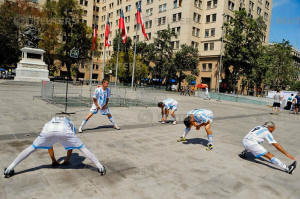|
Homeless World Cup to honor memory of late co-founder
 Send a link to a friend
Send a link to a friend
 [November 10, 2018]
By Christian Radnedge [November 10, 2018]
By Christian Radnedge
LONDON (Reuters) - As more than 500
soccer players gather in Mexico City next week for the 16th Homeless
World Cup, the tournament will take place against the backdrop of
the death last month of its co-founder Harald Schmied at the age of
50.
The Austrian, diagnosed two years ago with Amyotrophic lateral
sclerosis (ALS), created the tournament with Mel Young almost 20
years ago to improve the lives of impoverished people through the
beautiful game.
The first edition, held in Schmied's home country in Graz in 2003,
was won by the hosts and it has been an annual event since.
More than 40 countries now take part, with 400 games of four-a-side
taking place in a week-long football festival which has garnered
support from European soccer body UEFA and global professional
players' union FIFpro.
Two competitions take place, a men's/mixed event and a women's
program, with 48 teams set to compete in Mexico in the former from
Nov. 13-18.
However, even with organizers expecting 200,000 spectators and
millions of online viewers, the sadness at Schmied's death will not
be far from anyone's minds.

"He was a lovely person and a great friend," Young told Reuters in
an email.
"And of course he loved football. He could see the power it had and
he was often quoted when he talked about the highlight of the annual
event being the look on the players' faces at the opening parade.
"That look of genuine happiness, of being included and what life
might offer. There is always the same great atmosphere, same
friendship and warm-heartedness," he said.
"If there were more people like Harald around in the world then it
would be a much better place."
One player eagerly anticipating kickoff is Marco Chairez, a
23-year-old from Port Townsend, Washington who will play for the
United States.
"I am so honored to be a part of this amazing program that has
helped me turn my life around," Chairez told Reuters.
"Because of organizations like these people are able to do something
incredibly productive with their lives. As a homeless youth I know
that can be the key to opening many doors.

[to top of second column] |

Argentinian players warm-up before their soccer match against Chile
during 12th Homeless World Cup in Santiago City October 19, 2014.
REUTERS/Ivan Alvarado/File Photo

"The people that make these tournaments possible need to know that
they have created a positive impact in my life and in many others
that have suffered from homelessness."
HUGE UNDERTAKING
The goodwill involved helps facilitate a huge logistical
undertaking. Seventy countries are involved with the Homeless World
Cup Foundation and teams are selected by national soccer
initiatives, which pay for flights to the host city.
Tournament organizers cover the players' accommodation, food and
travel costs during the event.
"I hope to go and just have fun, play soccer, meet people, make
friends and learn from other players," Chairez added.
Chairez and his team mates may find it hard going should they play
Brazil, the most successful team in the tournament's history with
three titles.
Mexico can equal them if they win on home soil - something they
failed to do when they last hosted the event in 2012, losing 8-5 to
Chile in the final.
Of course, no sporting event can eradicate the many social
inequalities around the world, with global housing body Habitat for
Humanity estimating that 1.6 billion people lack adequate
accommodation.
The United Nations is still off track in its bid to end extreme
poverty which covers eight percent of the world's population. The
target is to get an average 1.6 people escaping poverty per second.
The current rate is 1.1.

Still, football offers a welcome respite from the horrors of living
on the streets and Young insisted that Schmied's legacy be
celebrated.
"We will miss him for sure but his final message was typical of
Harald when he urged people to turn their sadness into positive
energy," he said.
(Reporting by Christian Radnedge,; Editing by Ed Osmond)
[© 2018 Thomson Reuters. All rights
reserved.] Copyright 2018 Reuters. All rights reserved. This material may not be published,
broadcast, rewritten or redistributed.
Thompson Reuters is solely responsible for this content. |